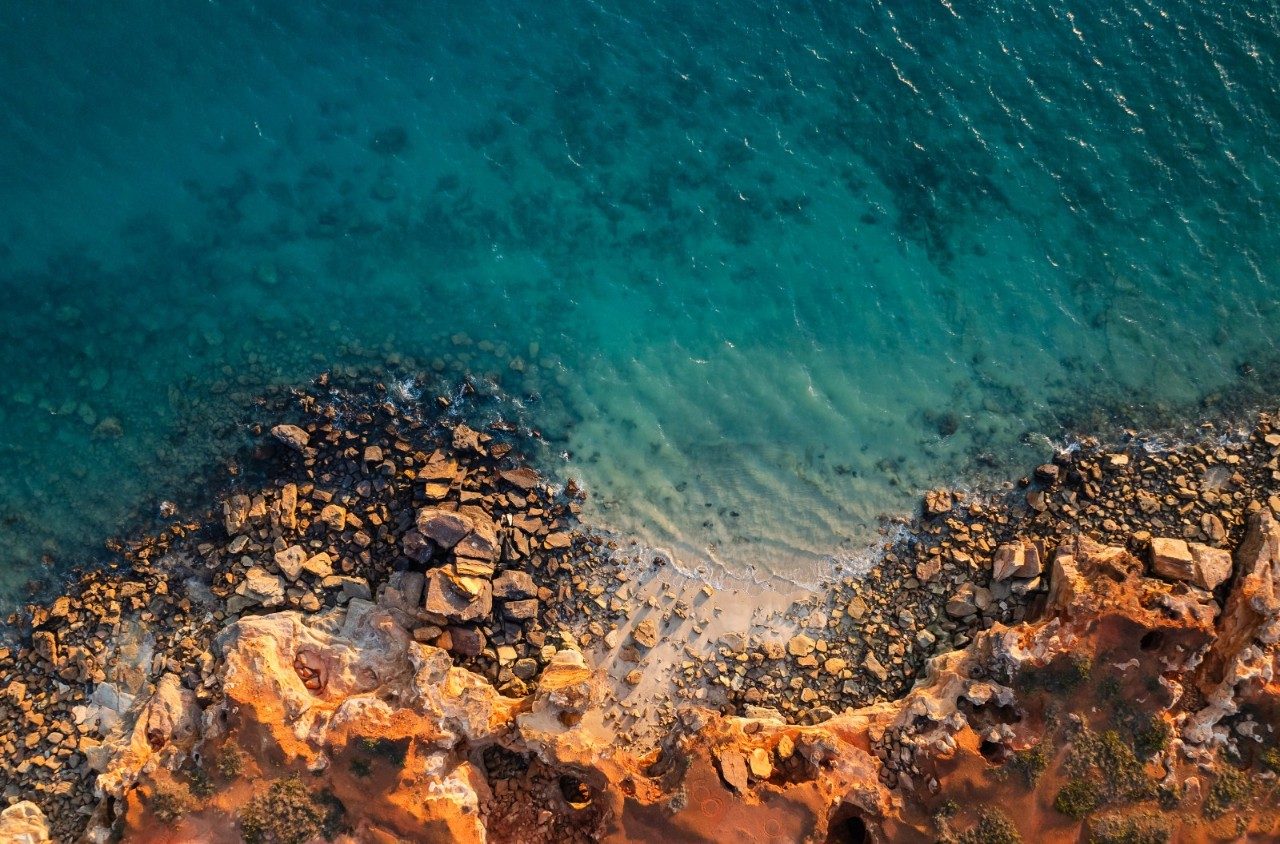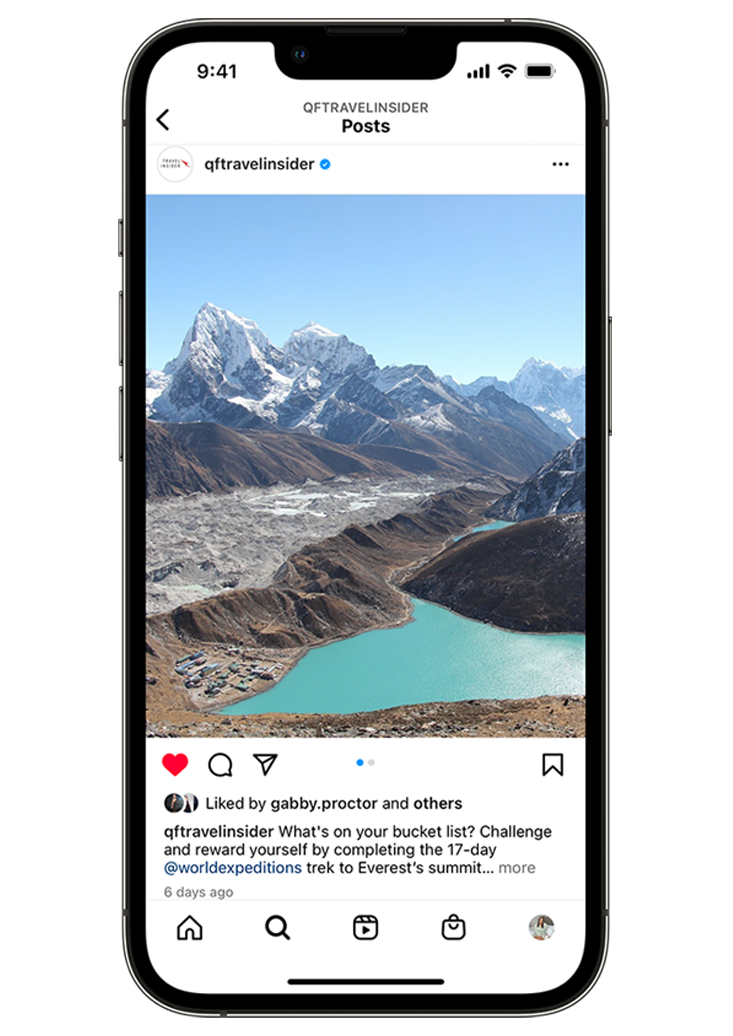You Won’t Need a Watch in This Magical Corner of WA

I’ve been on the Dampier Peninsula for two days when I take off my wristwatch. On this remote stretch of Western Australia’s coast, the Bardi Jawi people have no need for timepieces; they know the hour by the rhythm of the day and where the sun sits in the sky.
The Kimberley region’s unmistakable rust-red earth and turquoise sea have been home to the Bardi (from the mainland) and Jawi (from the islands) communities for tens of thousands of years. When you’re here, it’s imperative that you adjust to local time – and abandon Western notions such as itineraries. “You need to be flexible and go with the flow,” says Jawi woman Rosanna Angus. The spirited grandmother is the owner of Oolin Sunday Island Cultural Tours and I’ve joined the Bardi Oorany Injubs Cultural Tour, an immersive four-night experience exclusively for women that she runs in conjunction with Australian Geographic Travel. “I love history and I’ve dreamed of running women’s tours for years,” says Angus. In Bardi language, oorany means “woman” and injubs signifies the bond between mother and daughter. “History is important but it can be his story. This is our story – the women’s story – and I wanted to tell it.”

“We were the first paddleboarders,” Angus tells our group of five – a marketing manager in her thirties, three retirees and me – as we cruise through King Sound’s Middle Passage. Water here shifts in vast quantities, the world’s largest tropical tides, exposing and flooding reefs and rock formations and creating whirlpools metres wide. Before powerboats, the Jawi people crossed these treacherous waterways on biel biel (small rafts made from mangrove wood) to hunt, fish and trade on the mainland. “They perfected the art of navigation, from the stars to the tides,” says Angus. The skipper cuts the engine and our vessel hovers, held in place by the immense power of a whirlpool.

As we make our way at speed to Ewuny (Sunday Island), the wind offers a brief respite from the balmy 30°C heat. We skirt the edges of the island, a remote, rugged landmass where the mission that Angus was born at was established in the 1890s, before pulling into a cove. A lone sea eagle lands on top of a rock ledge that flanks the beach. Angus calls out to acknowledge her people and the majestic bird takes flight. She says the eagle always comes, carrying the spirits of her ancestors.

Ewuny has all the hallmarks of a deserted isle; silent, pristine, uninhabited. When the mission closed in the early 1970s, most people moved to the newly established Ardyaloon (One Arm Point) settlement on the mainland, which Angus now calls home. The Kimberley’s ever-present red sand stains the bitumen roads that snake through the neat neighbourhood of wattle trees and one-storey brick houses. I feel like an old friend as Angus points out everyday landmarks such as the school, medical clinic and grocery store. The town is close to the sandstone cliffs overlooking King Sound, as well as to the Master Pearlers Private Retreat, our home during our stay at Cygnet Bay Pearl Farm in Borrgoron (Cygnet Bay). The retreat is a rustic stand-alone property on a secluded headland, with wraparound verandas, three large air-conditioned bedrooms and a separate bunk room, and ocean views bordered by sandstone boulders and pandan trees. It’s also a compelling vantage point to witness the ebb and flow of those tides.
Later, the four-wheel drive bucks and lurches on the way to a beach frequented by lemon sharks. As I step onto the sand, a shiver of six yellow-grey predators circles about a metre from where we’re standing. Angus tells us that loolooloos (supernatural sharks) are considered protectors of Bardi Jawi seafarers. Standing on a promontory with a view to Ewuny, Angus radiates pride. “This is our backyard,” she says, gesturing towards the ocean, islands and sky. It’s a sliver of the 74,000-square-kilometre Bardi Jawi Gaarra Marine Park, which was returned to the care of its Traditional Custodians in 2022.

When night falls, Angus’s sister, Bernadette “Benny” Angus, builds a fire. With bellies full of homemade chicken risotto – our private chef fell through at the eleventh hour, leaving our hosts and the more culinary-minded among us to do the cooking – we sit and watch the flames. The sisters gleaned their vast knowledge of culture, land and sea from their grandmother, as is Jawi tradition. “All our education was around the fireplace or on Country,” says Rosanna.
“Everything is good for something,” Benny tells us the next day. She’s schooling us on bush food and medicine in the driveway of our accommodation (above), pointing out edible fruit (gubinge or Kakadu plum), berries that cure stomach upsets (joongoon) and the best seeds for making flour (wattle). “At the moment we’re living off seafood,” she says. “When the flowers bloom, it lets us know that the mullets are fat.” Later, at a nearby beach, she prises oysters the size of tea saucers from the rocks as I try to catch a fish. A handful of women from Ardyaloon have the same idea but their buckets groan with oysters long before I’ve made a decent cast. Then a sudden persistent tug on my line. “Reel it in!” the women urge. We eat my first-ever catch, a silver bream, with oysters cooked over the fire, for dinner.

It’s cultural practice that only men can discuss men’s business and vice versa so Rosanna enlists male relatives to present her Country in all of its complexity. We meet Jasman “Bolo” Angus, the Bardi-Jawi owner of Southern Cross Cultural Tour on a saltmarsh at Lullumb, where low crimson bushes pop against a landscape of crystalline white sand. “We don’t own the land; we have a partnership with the land,” he explains as he leads us through mangroves, paperbark forests and creeks. I drink from a freshwater spring, press my ear to a small hole in a tree where native bees hum and wade into the mangroves in search of crustaceans.
“It’s important to share our stories,” reflects Rosanna during a barbecue at the retreat on our last night. “Tourism is a vessel for us to talk about our culture and we’re creating opportunities for younger generations through this business.” The next morning, the sentiment is felt as we exchange goodbyes. “You’re our sisters now,” Benny tells us.



